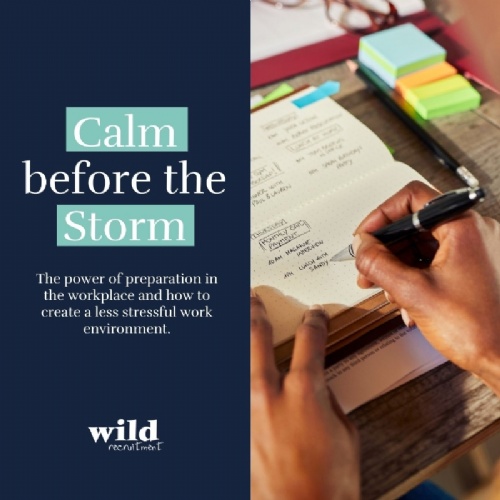Calm before the storm

“The more you prepare, the less you panic.”
Stress is a common challenge in the working world, whether you’re searching for a job, managing a team, or placing candidates in the right roles. Techniques such as mindfulness and exercise are proven to support stress management, but one of the most effective ways to reduce stress is through preparation.
From navigating job applications to handling recruitment deadlines and managing teams, being proactive can make all the difference. For Stress Awareness Month, we’re looking at how being prepared can help create a smoother, more productive, and, most importantly, less stressful work environment.
The power of preparation in the workplace
One of the biggest drivers of stress is uncertainty. When things feel unpredictable, stress levels rise. Being prepared can help eliminate the feeling of being overwhelmed by creating structure and setting clear expectations. Here are some ways you can stay prepared:
Anticipate demands
Knowing what’s coming allows you to plan effectively. If you’re looking for a job, having an updated CV and preparing for interviews in advance means you’re ready when opportunities arise. If you’re hiring, forecasting workforce needs and having a streamlined onboarding process ensures a smoother transition when new employees join.
Stay organised
Disorganisation is a major source of stress, and can often make even simple tasks feel overwhelming. Set yourself clear goals, using tracking systems and try to create an environment where work feels manageable rather than stressful.
Communicate clearly
Miscommunication often leads to last-minute stress. Set expectations early, provide regular updates, and ensure everyone knows what to expect, and you can reduce workplace tension and keep things running smoothly. For job seekers, make sure to be transparent and upfront about your career expectations and goals, whether it’s with an employer or your recruitment agency.
Turning preparation into a habit
Making preparation a core part of your routine doesn’t require drastic changes. Small, consistent efforts can make a big impact. Here are some simple ways you can create good habits in being prepared:
- Break big tasks into smaller steps - don’t overwhelm yourself with big tasks as this can lead to procrastination. Break your task up and tackle things gradually.
- Create checklists and systems - have a system in place to keep things efficient and stress-free. This could be a simple job application tracker on Excel or a work management platform like Asana.
- Schedule time for preparation - set aside dedicated time each week for planning and organising upcoming tasks.
- Reflect and improve - regularly assess what’s working and what’s not. If something still feels stressful, ask yourself: “Could I have prepared better? What changes can I make next time?”.
- Reward yourself for being proactive - turn preparation into a positive habit by celebrating small wins. Acknowledging your efforts keeps motivation high.
Stress often feels inevitable in the workplace, but much of it can be reduced, or even avoided, through being prepared. Whether you’re navigating a job search, managing a hiring process, or leading a team, taking proactive steps to plan, organise, and communicate effectively can make all the difference.
This Stress Awareness Month, consider how preparation can help you stay ahead, not just to manage stress, but to prevent it before it begins. Because when you’re prepared, you’re not just ready for the storm, you’re in control of it.

